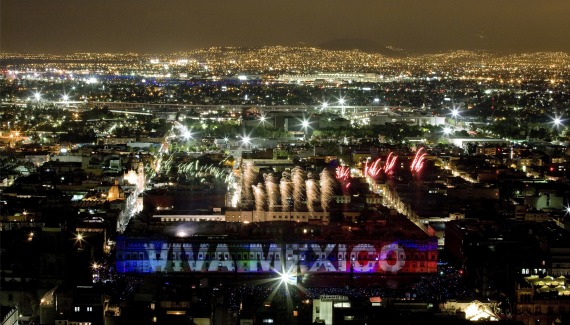The Way Mexicans View the World
More on:

Mexico’s Centro de Investigación y Docencia Económicas, or CIDE, released its latest study, “Mexico, the Americas, and the World.” This is now its fourth version (the previous surveys were done in 2004, 2006, and 2008) and provides a fascinating glimpse into Mexicans’ views (both from its leaders and the general population) toward politics, policies, and, in particular, international relations.
There are several interesting takeaways. On the domestic front, there are strong differences of opinion between elites and the masses. Mexico’s leaders are quite dissatisfied with the progress made in terms of social inclusion, economic development, and peace and security. This negative view confirms what one hears in the halls of congress and reads on the editorial pages of its leading newspapers. In contrast, Mexicans in general are much more positive about their country’s advancements. A fairly strong majority are satisfied with the steps forward in terms of social inclusion and economic development. Just under a majority (compared to one-third of leaders) are satisfied with the progress made regarding peace and security.
Economically, the main difference is that elites lead a general trend. Overall, Mexicans view globalization increasingly favorably. A relative majority - some 43 percent - believe globalization has been good for Mexico (outweighing the 28 percent that see it as bad). This positive view is up from 34 percent in 2004 - climbing despite the 2008-9 global economic crisis. Mexico’s leaders are way out in front – with nearly three-quarters in favor of globalization. A strong majority of all Mexicans support free trade and foreign direct investment (though not in the state-run oil sector), and believe that trade and investment have brought benefits to their country and to them personally. Riding this wave of enthusiasm, two- thirds want to integrate economically with the rest of Latin America – likely an impetus behind the free trade accord scheduled to be signed between Mexico, Chile, Colombia and Peru in Lima next week.
Though increasingly looking outward economically, fewer Mexicans seem to be moving. The number of Mexicans reporting family members abroad fell from 61 percent in 2004 to 52 percent last year. This matches fairly closely with U.S. immigration statistics, which report 2004 as the height of Mexican immigrant inflows. Moreover, slightly less than half of Mexicans think migration is good for their families, their communities, or for Mexico. Elites are even more pessimistic about its benefits – for anyone other than the country receiving their fellow citizens (e.g. mainly the United States).
Looking northward, Mexicans generally feel warmly toward their neighbor. The public ranks the United States a very close second to Canada (Mexico’s leaders put the U.S. further down the rankings, next to China) in their affections. Many more "admire" the U.S. than disparage it, and while still somewhat wary of their neighbor, "confidence" has improved significantly - up 5 points since 2008. In fact, for the first time, a majority sees being neighbors as a distinct advantage for Mexico, rather than a problem.
Both Mexico and the United States are headed into presidential elections seasons. In the past, elections have often brought out the worst in the bilateral relationship, as politicians point fingers for short-term electoral gains. Yet this CIDE survey shows that Mexicans now hold more goodwill than not toward their northern neighbor, and favor a closer relationship with the United States than ever before. Let’s see if politicians truly read the polls, and appeal to this now broad constituency.
More on:
 Online Store
Online Store